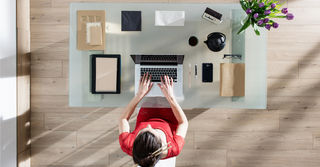Psychology
6 Benefits of an Uncluttered Space
The psychology behind organizing and decluttering.
Posted February 12, 2018 Reviewed by Jessica Schrader

1. Decluttering creates a sense of confidence and self-efficacy (seeing yourself as competent).
Decluttering utilizes your decision-making and problem-solving skills: You've got Y amount of space and X amount of stuff. To make everything fit, you need to make reasonably quick decisions about whether to keep or discard items, and where to put them. Doing this successfully can help you feel confident about your decision-making skills. It helps you feel like you're adulting!
2. Decluttering is energizing.
This is related to the first point. When you make a series of quick decisions (and therefore solve a series of problems), you put yourself into getting-things-done mode. When you do this, you're likely to find that you feel energized enough to start ticking other things off your to-do list.
3. Cleaning and organizing reduce anxiety.
We've evolved a preference for order and symmetry because, presumably, those things conferred an evolutionary advantage back in our ancestral environment. When things feel out of order, it can (but not always does) make us feel scattered and anxious.* Creating order relieves that anxiety.
You can observe this most clearly in people with obsessive-compulsive disorder. For people who obsessively clean, organize, or count things, those behaviors make sufferers feel (temporarily) calmer. This is an extreme example; however, many clinical conditions involve what are generally helpful psychological mechanisms gone awry.
4. Decluttering allows mind wandering and (sometimes) involves physical activity.
If you've been concentrating on hard cognitive work at your job or elsewhere, giving your mind a chance to wander can help you generate further insights into whatever it was you were working on. Physical activity can help supercharge this. Therefore, organizing that involves some physical component (like moving heavy items around) can create ideal conditions for having light-bulb moments and other leaps of insight.
5. Decluttering can reduce relationship and family tension.
Clutter can create family stress. You might argue about mess with your spouse, or find yourself snapping at your children if you've spent 10 minutes looking for something and are now running late. Decluttering can reduce this stress.
6. When you declutter, you often find lost treasures.
When you declutter, you often find items you'd forgotten you had. For example, I recently decluttered my health/first-aid shelf. I found some unexpired magnesium tablets, which were on our household shopping list. I also found a cooler bag I'd been given at the hospital when I had my baby (two years ago!) that I've repurposed for keeping drinks cool. These finds can create a sense of serendipity and abundance that can boost your mood and increase your energy for tackling bigger issues.
*I'm not suggesting that everyone would benefit from working or existing in a perfectly clutter-free and organized space. There's evidence that working among some degree of mess can be energizing and can have a positive impact on creativity in certain circumstances. This is subtly different from the point that the act of occasionally cleaning up that space can also be energizing.
Want an email notification when I publish a new post? Subscribe here.


